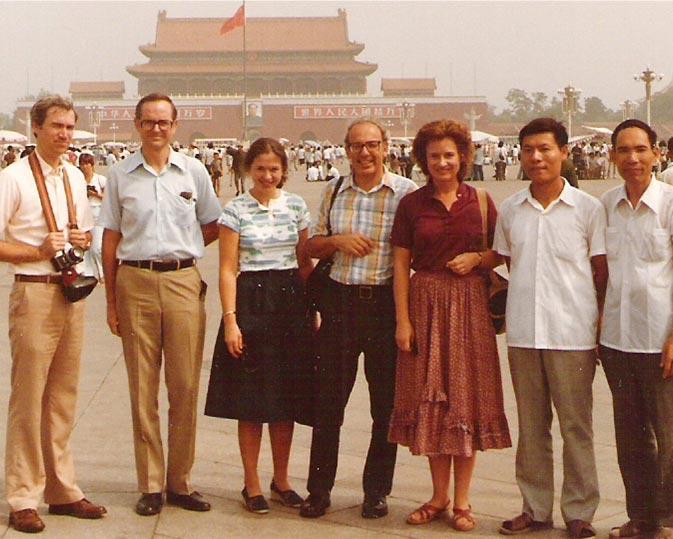Former NCI Scientist William Blot Retires after a Long, Celebrated Career
, by DCEG Staff
On June 28, the Vanderbilt-Ingram Cancer Center and Vanderbilt Epidemiology Center hosted an event to “Celebrate the Career and Discoveries of William J. Blot, Ph.D.,” the founding chair of the university’s epidemiology program and Associate Director of Population Science Research. Stephen J. Chanock, M.D., Director of DCEG and a speaker at the commemorative event, noted, “Before coming to Vanderbilt, Bill Blot made seminal contributions to the development of the intramural epidemiologic research program at the National Cancer Institute (NCI).”
After receiving his Ph.D. in statistics at Florida State University and working at the Atomic Bomb Commission in Hiroshima, Japan, Dr. Blot joined the NCI in 1974, where he became Chief of the Biostatistics Branch. At NCI, Dr. Blot developed studies to explain geographic patterns of U.S. cancer mortality. Cancer “hot spots” served as the impetus for a series of his epidemiologic field studies. This strategy provided new insights into carcinogenic hazards, such as smokeless tobacco associated with oral cancer and arsenical air pollution and asbestos in relation to lung cancer. In addition, his innovative analysis of time trends in cancer incidence and mortality revealed, for example, an alarming increase in esophageal adenocarcinoma. He followed up with studies that clarified the role of obesity, reflux, and several other risk factors for this malignancy.
Thinking of those early days at the NCI, Joseph F. Fraumeni, Jr., M.D., Founding Director of DCEG, and Scientist Emeritus, recalled, “When Bill first came to NCI, I gave him a dataset to analyze. Within a few days, he had the data thoroughly analyzed and a manuscript written that was perfect, requiring no revisions. It was remarkable. He maintained that high level of productivity and quality over his entire career, with a prolific record of accomplishment.”
In the mid-1980s, Dr. Blot recognized the research opportunities afforded by the remarkable geographic patterns of cancer being reported in China. With his ever-present diplomacy, tact, and wisdom, he forged deep collaborations with Chinese scientists and conducted a series of collaborative studies in areas with exceptionally high mortality rates for particular tumors. He directed the first large-scale prevention trial for esophageal squamous carcinoma in a high-risk population, demonstrating a reduction in risk from a dietary supplement of selenium, vitamin E, and beta-carotene, perhaps related to the correction of nutritional deficiencies seen in this population. In another high-risk population, Dr. Blot designed a multifactorial trial showing that eradication of the bacterial infection Helicobacter pylori inhibited the progression of precancerous gastric lesions. Opportunities for prevention on a global scale have also resulted from his studies into the elevated risk of lung cancer among non-smoking Chinese women as a result of indoor air pollution from coal burning stoves.
Martha S. Linet, M.D., Scientist Emerita, and former Chief of the Radiation Epidemiology Branch, who collaborated with Dr. Blot on a landmark study of Chinese workers exposed to benzene, noted, “Bill’s creative ideas along with his quiet style of leadership have inspired many epidemiologists who have felt honored to be in his orbit. The eight years I spent in the Biostatistics Branch with Bill as my Branch Chief were the most productive and exciting of my career. Bill is an amazing mentor who brings out the best in those who are fortunate to work with him.”
After leaving the NCI, Dr. Blot co-founded the International Epidemiology Institute, a biomedical research firm which, among other activities, was contracted to develop an epidemiologic research program at Vanderbilt University. Joining the faculty of Vanderbilt, Dr. Blot built upon his long-standing interest in racial disparities in cancer incidence by designing the Southern Community Cohort Study, which filled a critical research gap and has become a landmark national resource for elucidating why certain cancers arise in excess in African Americans, as well as a platform for preventive interventions. The study provided key evidence used by the United States Preventive Services Task Force to lower the age and smoking history recommendations for lung cancer screenings.
Dr. Blot has been an extraordinary leader in the field of cancer epidemiology and prevention, leaving an indelible mark on the NCI and other institutions around the world.

